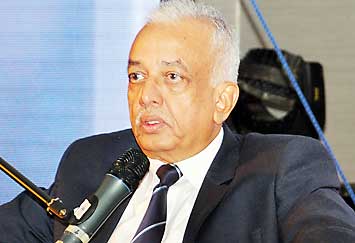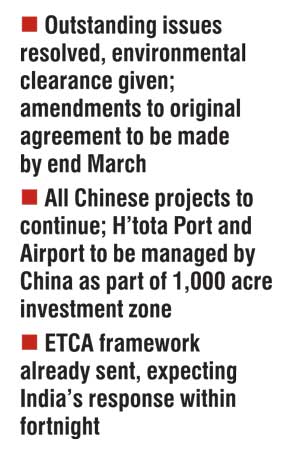Thursday Feb 19, 2026
Thursday Feb 19, 2026
Thursday, 10 March 2016 00:00 - - {{hitsCtrl.values.hits}}

 By Charumini de Silva
By Charumini de Silva
Fresh from what he described as a successful tour of China, a top Minister yesterday insisted Sri Lanka had resolved its differences with Beijing and was ready to recommence a $ 1.4 billion Port City project with environmental clearance already granted.
Having concluded his visit to China, Strategic Development and International Trade Minister Malik Samarawickrama said that he was upbeat about the opportunities in engaging investors from China, adding that all “outstanding issues have been successfully resolved”.
Speaking at the ‘Sri Lanka Investment and Business Conclave 2016’ organised by the Ceylon Chamber of Commerce on ‘Unlocking New Opportunities for Potential Partnerships in Sri Lanka,’ he said the Government gave approval to the Environmental Impact Assessment (EIA) on Wednesday for the Colombo Port City Project which was suspended for over a year, noting that the company could resume work “very soon”.
“We discussed all outstanding issues, all outstanding matters have been resolved,” declared Samarawickrama, referring to discussions during his visit. “Now it’s all systems go as far as China is concerned.”
However, the Minister acknowledged there would be several amendments to the original agreement which would be completed within the course of this month.
“Land will not be given on a free-hold basis, but on a 99-year lease. Once the land is cleared, the whole project will be under a joint venture between the Government of Sri Lanka and the Chinese company. In addition, all the other projects with China such as the Southern Expressway, extension of railways from Beliatta to Kataragama, so on and so forth, will continue.”
The Government had also invited the Chinese investors to come on board on a Joint Venture basis to operate and turnaround loss making Mattala Airport and Hambantota Port. “They have agreed to send a proposal within a couple of weeks to operate the Port as well as the Airport. In addition they will set up an industrial zone in a 1,000 acre land in Hambantota,” he assured.
Samarawickrama added that the Government was also looking at increasing investments through trade agreements with India, China, Singapore and Turkey.
He said China was also keen on Sri Lanka finalising the Indo-Lanka Economic and Technical Cooperation Agreement (ETCA) as setting up industries in the country would benefit them to access the Indian market.
Assuring that there was no doubt ECTA would be favourable for Sri Lanka exports, he said Sri Lanka’s framework agreement had already been sent and India’s response was expected within the next couple of weeks.
He reiterated free movement of people under ETCA would not be allowed.
Samarawickrama also revealed that they had had discussions with the Government of Singapore to develop the Trincomalee city for tourism as well as establish a new port. To develop the Trincomalee Port, the Government intends to enter into a multilateral deal with Singapore, Japan and India.
In addition the Government had invited Japan to draw a plan to extend Kandy City to ease congestion. The Minister said although the planning was done by the Government, most of these development projects would be in the hands of the private sector, creating opportunities for the local and foreign investors to work on PPP basis, joint ventures or on BOT basis.
“All these projects will be made available within this month,” he added.
Public Enterprise Development Minister Kabir Hashim said the Government would take lessons from the world, creating partnerships and opening up investments, where the State could work hand in hand with private sector and foreign investors to reform loss-making State Owned Enterprises (SOEs).
The Government has ruled out privatisation, he explained, but said it would look at many success stories across the world and adopt best lessons on a localised basis which would fit Sri Lanka.
“SOEs are an integral part of our economy, as it impacts the overall performance of the economy. The Government will most probably play a role having an equity stake as most of the investors are looking at making the Government an equity partner, but the entire management would be held by the investor himself. We are very flexible in offering partnerships in the SOEs with FDIs,” he stressed.
The Export-Import Bank of India (Exim Bank) signed Buyer’s Credit Agreements, under National Export Insurance Account (BC-NEIA) amounting to $ 403.01 million with National Water Supply and Drainage Board (NWSDB) of Sri Lanka in Colombo, for financing three water supply projects.
Under the agreement, which was signed on Tuesday, the funds will be used for the Aluthgama, Mathugama and Agalawatta Integrated Water Supply Project; the Polgahawela, Pothuhera and Alawwa Integrated Water Supply Project; and Kundesale, Haragama Water Supply Project, the Indian High Commission said in a statement.
The agreements were signed by Chairman and Managing Director Yaduvendra Mathur on behalf of Exim Bank and NWSDB Chairman Kuddoos Alahudeen Ansar and NWSDB Vice Chairman Mohamed Shafeek Rajabdeen in the presence of City Planning and Water Supply Minister Rauff Hakeem, High Commissioner of India Y.K. Sinha and senior officials of the Government of Sri Lanka.
Speaking on the occasion, Hakeem expressed satisfaction at the conclusion of these agreements and thanked the Government of India for financing the three water supply projects, adding that the projects would supply potable water to nearly one million people.
Mathur thanked the High Commission for facilitating the conclusion of these Buyer’s Credit agreements and reiterated EXIM Bank’s commitment to finance further projects in Sri Lanka.
Under the Buyer’s Credit portfolio, EXIM Bank has already extended credit amounting to nearly $ 185 million to Sri Lanka for water supply and other projects.
The Buyer’s Credit Scheme of India is a unique financing mechanism that provides a safe mode of nonrecourse financing option to Indian exporters and serves as an effective market entry tool to traditional as well as new markets in developing countries, which need deferred credit on medium or long term basis, the statement added.